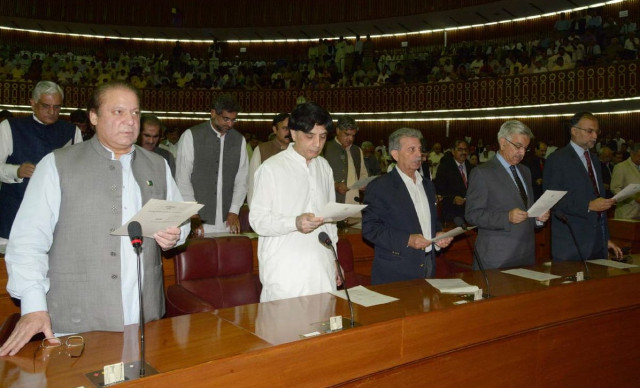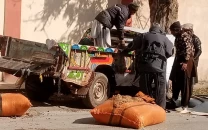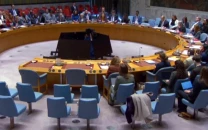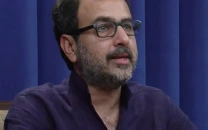Analysis: A day to remember
It's the job of Nawaz Sharif and PML-N to lead the nation through the 2nd phase of transition starting from June 5.

Nawaz Sharif would certainly need the help of all the political parties inside the House, also of the establishment, the judiciary and the media. PHOTO: NNI
Let us leave history to historians. For now let us celebrate the inauguration of the second phase of our political transition that had begun with the signing of the Charter of Democracy between the late Benazir Bhutto and Mian Nawaz Sharif in 2006. The first phase of this transition came to a close on June 1, 2013.
During this phase the two main political parties — the PPP and the PML-N — along with the establishment, the Judiciary and the media were seen bending over backwards to keep from derailing the process of transition from the age-old establishment driven rule of the boots to rule by advice and consent. The elected House of 2008 was seen making Herculean efforts to restore its lost sovereignty and the so-called establishment tried, it is believed, equally hard to remain out of Parliament’s hair. The two seemingly succeeded to an extent but for the country to enter into a genuine democratic process much more remains to be achieved.
During the first phase, both the judiciary and the media acquired for the first time in our history their respective rightful places in the democratic scheme of things. And, again during this phase Pakistan took decisive steps to becoming a federation in the true sense of the term. And again, for the first time in our history an outgoing speaker of the House administered oath to the newly elected members.
Now it is the job of the incoming Prime Minister, Nawaz Sharif and his party to lead the nation through the second phase of transition starting from June 5, 2013 and put it back on the road to real democracy unscathed and without any hiccups. In this endeavour he would certainly need the help of all the political parties inside the House, also of the establishment, the judiciary and the media. This does not mean that the opposition should not make the right noises when it feels that government is straying into unwanted lanes. Similarly, the judiciary needs to continue its activism but without seeming to be trying to bring governance to a standstill and the media needs to continue to play the role of the watchdog without seeming to be creating unnecessary problems for the government in its desire to remain ahead of the competition---driven not by public service but by a soulless market.
The mandate of the ruling party also demands that it immediately stop the corrupting practice of allocating development funds to members, get the consent of the House for adopting a truly genuine accountability bill, shun the habit of running the government on free foreign lunches and give up the practice of protecting the rich one per cent at the cost of deepening the suffering of the not-so-rich 99 per. Then alone would it be able to come up with a nationally acceptable socio-economic agenda capable of lifting the country out of the depths it has fallen in.
Some quarters think that the election results were a verdict against terrorism. Much as one would like to believe this notion, it is, however, difficult to accept it in view of the fact that the highest and the second highest votes were polled by two parties which had declared that they would prefer to negotiate with militants. And the militants too had chosen one of those parties to be a guarantor of the proposed talks. Both Nawaz and Imran are in for a rude shock in this regard and their leadership qualities would be tested when their supporters would question them on this issue as one does not see talks taking place at all, and if they do take place they are likely to end up deepening the mutual acrimony. The two would also be put to test also on the issue of drones because one does not see the US stopping drone attacks until after the last US soldier has left Afghanistan.
Lastly, parties with heavy mandates have been known to have collapsed under the weight. That is a serious challenge for the PML-N leadership. In the last five years the judiciary was seen taking over a number of functions that, according to one interpretation of the Constitution, belonged solely to the elected executive. Similarly, the media was also seen taking upon itself the task of setting up the national agenda and narrative. Here again the leadership qualities of Nawaz Sharif would be put to test. It is a tightrope walk. One wonders if he has what it takes to preserve and protect the powers of the executive without curtailing the legitimate scope of action of these two institutions. And finally, keeping important portfolios like the Punjab CM’s job and the finance ministry within the family does not seem to augur well for building democratic traditions.
Published in The Express Tribune, June 2nd, 2013.


















COMMENTS
Comments are moderated and generally will be posted if they are on-topic and not abusive.
For more information, please see our Comments FAQ